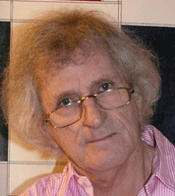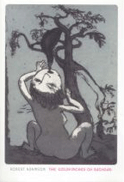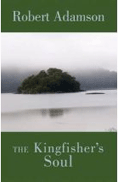Robert Adamson – March 13 2016
 Robert is currently the inaugural CAL chair of poetry at the University of Technology, Sydney. He has edited New Poetry Magazine and established the imprints Prism Books (1971), Big Smoke Books (with Dorothy Hewett, 1979) and Paper Bark Press (with Juno Gemes and Michael Wilding, 1986). Robert’s poetry has dealt with his experiences in reform school and prison, the landscape of the Hawkesbury River where he has lived (and fished) for many years, his personal relationships, and his colleagues and mentors including the Sydney painter Brett Whiteley and poets Francis Webb, Michael Dransfield and US poet Robert Duncan. Robert’s other works include Canticles on the Skin, Cross The Border, Where I Come From, The Clean Dark, Waving to Hart Crane, Black Water: Approaching Zukofsky, Mulberry Leaves: New & Selected Poems 1970-2001, Reading the River: Selected Poems, The Golden Bird: New and Selected Poems, Empty Your Eyes and his latest work, Net Needles.
Robert is currently the inaugural CAL chair of poetry at the University of Technology, Sydney. He has edited New Poetry Magazine and established the imprints Prism Books (1971), Big Smoke Books (with Dorothy Hewett, 1979) and Paper Bark Press (with Juno Gemes and Michael Wilding, 1986). Robert’s poetry has dealt with his experiences in reform school and prison, the landscape of the Hawkesbury River where he has lived (and fished) for many years, his personal relationships, and his colleagues and mentors including the Sydney painter Brett Whiteley and poets Francis Webb, Michael Dransfield and US poet Robert Duncan. Robert’s other works include Canticles on the Skin, Cross The Border, Where I Come From, The Clean Dark, Waving to Hart Crane, Black Water: Approaching Zukofsky, Mulberry Leaves: New & Selected Poems 1970-2001, Reading the River: Selected Poems, The Golden Bird: New and Selected Poems, Empty Your Eyes and his latest work, Net Needles.
 The Goldfinches of Baghdad
The Goldfinches of Baghdad
Flood Editions, 2006; ISBN 9780974690285
This volume explores the landscape of the Hawkesbury River, sounding its waters and wildlife for psychological resonances. As Robert Creeley writes, “Robert Adamson is that rare instance of a poet who can touch all the world and yet stay particular, local to the body he’s been given in a literal time and place. He is as deft and resourceful a craftsman as exists, and his poems move with a clarity and ease I find unique.”.

The Kingfisher’s Soul
Bloodaxe Books, 2009; ISBN 9781852248208
Nourished for much of his life by Australia’s Hawkesbury River, Adamson’s poetry praises nature – red in tooth and claw – and celebrates existence as a mythological quest. In this volume he confronts a range of contradictions: how the fish he kills to make a living also sustain his vision as poet; and how he uses birds from the sky for his paintings. He wonders about the existence of God as well as the different meanings of souls of humans, birds, fish and animals. Some of the poems look at war, and many come back again to love.
